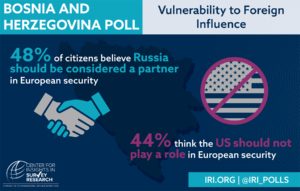 Bosnia and Herzegovina’s citizens are deeply pessimistic and vulnerable to external influence, according to a new national poll by the International Republican Institute’s Center for Insights in Survey Research.
Bosnia and Herzegovina’s citizens are deeply pessimistic and vulnerable to external influence, according to a new national poll by the International Republican Institute’s Center for Insights in Survey Research.
Some 86 percent of respondents think the country is heading in the wrong direction, while 53 percent say the security situation is unsatisfactory, with 42 percent believing that ethno-nationalism is the country’s most pervasive type of extremism, the survey finds:
The survey also suggests that while most respondents are supportive of key transatlantic institutions, many are also in favor of cooperating with Russia on security interests, and do not think the U.S. should play a role in European security. A combined 56 percent either “strongly support” (37 percent) or “somewhat support” (19 percent) joining NATO, and a combined 75 percent either “strongly support” (49 percent) or “somewhat support” (26 percent) EU accession. Despite these pro-Western stances, 48 percent of citizens believe that Russia should be considered a partner in European security, while just 28 percent want the U.S. to play a role in European security.
“The combination of high levels of pessimism, concerns for the country’s security situation and the belief that ethno-nationalism is the most common type of extremism is disturbing,” said Paul McCarthy, IRI’s Deputy Director for Europe. “There is a danger that these sentiments could be manipulated by illiberal forces both within and outside of the country to fuel extremism.”
“The split in attitudes toward Western institutions and Russia indicates that citizens of BiH could be vulnerable to manipulation by the Kremlin,” he added. “It is vital that transatlantic stakeholders invest in engagement in BiH to ensure that the country remains on a European—and democratic—trajectory.”







